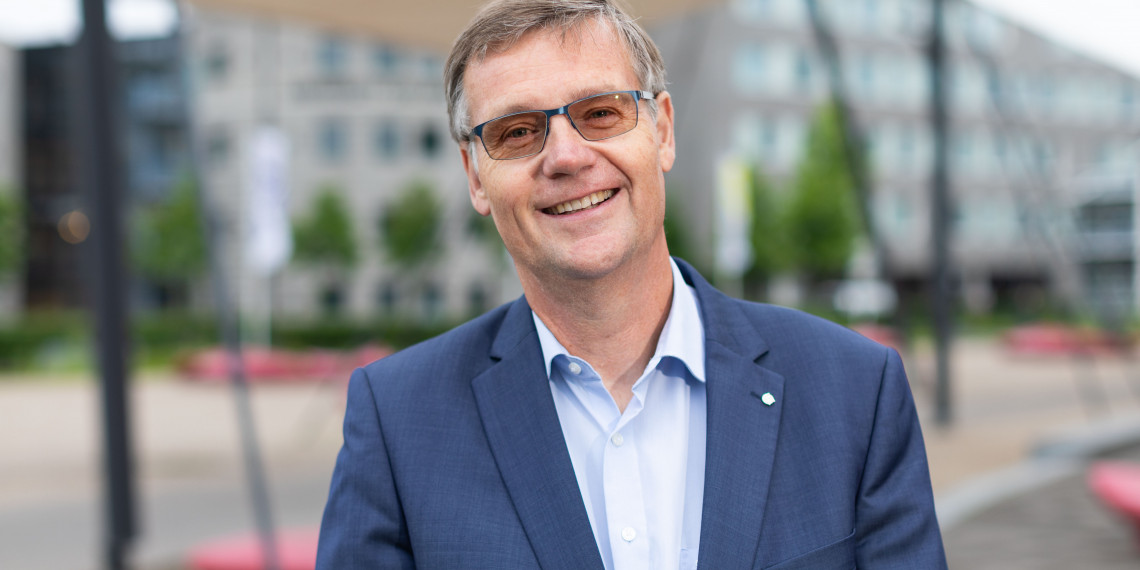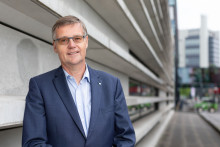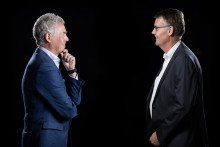He is enjoying his role very much, he says with a broad smile. Although it is far more demanding than his stint as dean of the ITC faculty, Veldkamp says. ‘A different role with a broader vision. I was involved in a surprising number of consultations with strategic alliances: 4TU, VSNU, ECIU, VU…. It is a facet I did not have a very good insight into as dean. But it helps to define your own position within the whole. You ultimately want to operate on your own steam. For the UT, that is Shaping2030. That is precisely the reason I applied for this job.’
‘I don’t know’
Although Veldkamp is looking forward to 2030, the corona crisis is still the order of the day. He says he is just as surprised as he is concerned about people’s emotions running high when it comes to the pandemic. But it is forcing him to consider the university’s role in society. ‘I do understand: the situation is affecting many people on a deep level. But there is no clear-cut solution for such an immense problem as the corona crisis.’
Meanwhile, he sees so-called experts speaking indiscriminately on talk shows all the time. ‘Yet the role of experts – particularly those from universities – is to relay scientifically substantiated views that are based on objective and reproducible research. You can’t just make claims. And it’s not as if we are those experts in white lab coats who know the answers. Sometimes – or especially – as a scientist you have to say: I don’t know.’
In search of the silent majority
Veldkamp sees the extroverts defining the societal debate while the introverts are snowed under. He therefore wants to hear more from them at the UT, especially when it comes to student welfare. ‘That is a very important theme. We say people first, I almost want to interpret that as students first. Since the more extreme views are currently prevailing, I want to know more about the silent majority. I want to gather more information from them to inform policy and am consulting with various committees, students and study advisors.’
He knows he won’t find a cure-all for everyone. ‘But it is certainly not the case that those who shout the loudest are right. For me, it is about a respectful approach towards everyone and trying to accommodate people as much as possible. Finding that happy medium is an emotional balancing act, particularly when you consider our diverse student population. But that is without a doubt what makes it interesting and challenging.’
Veldkamp advocates for an inclusive policy; a university where every student can develop, whether you come here primarily for your diploma, or you want to immerse yourself in student activism. There is good news for the latter group: Veldkamp wants to reinstate the board minor (bestuursminor) soon. ‘I regard a minor like that in which you get ECs for your activism as cutting both ways: recognition as well as formal learning from such experience by working on your softs skills.’
Outside the ivory tower
Veldkamp is following through on those soft skills in his two administrative priorities: the master’s vision and better focus in research. The UT will take on a different role in society in the coming decade, the rector is convinced of that. ‘We are not so much opening the windows or door of the ivory tower as we are stepping outside and immersing ourselves in the wicked problems in society. It is a different playing field to what we had in the past when we focused primarily on the business sector as an entrepreneurial university. This new playing field demands of scientists that they don’t just work with businesses or other disciplines, but with citizens too. That is a different way of communicating and collaborating. One thing is certain: our role in society and the way we work is changing.’

At the dies natalis in November.
‘Give more colour to Twente masters’
The master’s programmes are going to change. They will become more challenge-based, the rector explains. ‘We are going to give more colour to the Twente masters, because it has been some time since we made changes. That means that in addition to mastering professional know-how, you will also have a multi-disciplinary mindset and be able to design solutions by the end of your programme. Social skills are more important than ever for this. You need to interact with society. I want everyone who does a master’s to pick up some of that. We still need to make it more tangible in terms of implementation; after all, we have specific and broad masters and it is important to get that wide array right. The guiding principle is: if you studied in Twente, you are a different kind of master.’
‘Define our own identity better’
In addition to reforming the masters, Veldkamp wants to be more selective in terms of the UT’s research strategy. ‘We still chase after the financing too often and lack direction. We will therefore also focus on impact domains: what research impact is really UT? We need to be clearer about what we are, what we want to be – and above all – what we don’t want to be.’ No, by no means does he want to close the door to research domains that appear to fall outside the focus areas. ‘But focus does create opportunities. We are trying to create a snowball effect. We need to define our own identity better if we want to have more influence on external strategic agendas.’
Both the master’s vision and the research strategy are long-term projects for the coming years. Veldkamp assures us he is not going to flip everything on its head from one day to the next considering the work pressure. ‘Call it administrative dexterity, but I’m opting for a gradual approach. I would prefer to burden our people as little as possible and want to minimise the need for regulation.’
Take more control itself
The UT is dependent on the dynamics of government politics, says the rector. ‘Financing is based our performance two years ago; so it is retrospective. In addition, there is still not enough money going to universities on a structural basis and I wonder whether the recently announced support package will help with that.’
Veldkamp hopes the UT will be able to take more control itself, especially when it comes to quality assurance. ‘When the separate programme accreditations disappear and we move to accreditation at institute level, that could reduce the burden considerably. Then it will come down to your quality being an integral part of your daily thinking and action. Not that we will have students complete yet another evaluation and turn it into a box-ticking exercise. We need to anchor quality in our overall way of working. That is what makes you distinctive as a university.’
On track
What role the rector wants to play himself? ‘One moment you have to give a little push, the next you need to slow down. Sometimes it is about being an ambassador or connecting, or establishing the right prerequisites. Then outlining the bigger picture to subsequently develop balanced and well-considered policy. Above all, I want to know exactly what people’s experiences are and to adapt my role to the situation.’
Meanwhile, both his fellow board members recently announced their imminent departure. Veldkamp thinks that’s a shame. ‘But I also know you are expendable as a member of the board. You are there to finalise policy and to direct the forcefield inside and out during the time you are there. Our organisation is in good shape. If we stay on track, I have no concerns. The search for my new colleagues started last week. I am hoping for chemistry, for pleasant and professional colleagues. We must be able to rely on one another.’
Feel at home
Where will the UT be in four years, at the end of his first term? ‘I hope we will have a university where people feel at home. Where the artificial divide between education and research is reduced and where we work on meaningful themes in a challenge-based manner. That is what connects us to society.’ But we first need to get the pandemic behind us, says Veldkamp. ‘Things won’t be the same again. But I think a mid-August Kick-In that is as normal as possible is a good goal.’







